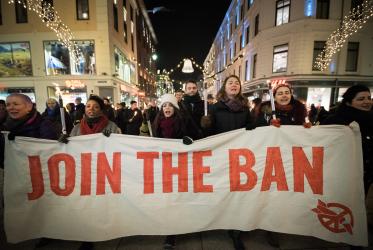Reflections by Jonathan Frerichs (*)
Like an annual check-up where the patient disputes the diagnosis and refuses treatment, five states out of nearly 200 governments who met at the United Nations, New York, from 28 April to 9 May, continue to hang onto an "illness" the international community has long agreed is unhealthy and catastrophic – their nuclear arsenals.
An ecumenical delegation was present to advocate for a strong humanitarian remedy, one that has wide international support and that World Council of Churches (WCC) member churches on five continents brought to governments in advance of this 2014 meeting on the Non-Proliferation Treaty (NPT).
The nuclear powers could not block the careful diagnoses of the global nuclear malaise offered by the conference chair Ambassador Roman-Morey of Peru and by many of the 184 countries without nuclear weapons. Yet representatives of nuclear powers, such as the United States, Russia, the United Kingdom, France, and China and their allies were at pains to show that the real problem does not lie with them.
The real problem, they said, is with states that do not have nuclear weapons and might acquire them. This is similar to someone with an infectious disease refusing treatment while insisting that everyone else must be quarantined. NPT resolutions have foundered repeatedly on the same argument.
Alternative, energizing approaches were rife in the conference chamber and in dozens of side events. Chief among them is the need to deal with “the devastation that would be visited upon all humankind by any use of nuclear weapons and since there is no competent international capacity to address the resulting catastrophic humanitarian consequences,” as the chair’s final recommendations put it.
Ecumenical delegates met with representatives of governments on all sides of the issue—some with nuclear weapons, some without, and some dependent on the US nuclear arsenal. The meetings discussed national action called for by the recent WCC Assembly; namely, for all states to address conclusively the humanitarian impact of nuclear weapons of mass destruction. Assembly policy and church actions for peace on the Korean peninsula were explained in a panel proposing a nuclear-weapon-free zone in Northeast Asia. The WCC took part in a meeting of Christian, Buddhist, Muslim and Jewish leaders exploring new multi-religious initiatives for nuclear abolition. Dr Emily Welty, a Pace University professor from the Presbyterian Church (USA) and former international affairs commissioner of the WCC, and Mr Steve Hucklesby, policy advisor to the Methodist, United Reformed and Baptist churches in the United Kingdom, were ecumenical delegates at the NPT.
Nuclear testing in the Pacific made unexpected headlines at the conference. The Marshall Islands announced at the outset that it was taking each of the nine nuclear-armed states to the International Court of Justice for their failure to comply with the disarmament obligations in the NPT. Radiation from tests carried out in the 1950s and 60s still affect Pacific islanders’, including member churches there.
“It is hardly possible to have a smaller David and a bigger Goliath,” one ambassador said of the Marshall Islands’ lawsuit against the USA, Russia, China, France, United Kingdom, India, Pakistan, Israel and North Korea. The only recourse being sought by the small island nation is that nuclear disarmament be completed within a short, specified timeframe.
“The real question is this: Can the current dynamics of the global nuclear disarmament and non-proliferation regime deliver on the promise of nuclear abolition?” a representative of Project Ploughshares of the Canadian Conference of Churches said of the conference. “With poor prospects for a ‘yes,’ an increasing number of non-nuclear-weapons states are openly challenging the status quo.”
(*) A reflection on the news, by Jonathan Frerichs, WCC programme executive for peace building and disarmament, is a member of the Evangelical Lutheran Church in America.
WCC statement on the Way of Just Peace
WCC statement on Peace and Reunification of the Korean Peninsula






